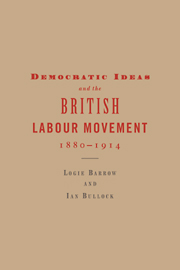Book contents
- Frontmatter
- Contents
- Acknowledgements
- Introduction
- Part 1
- Part 2
- Part 3
- 7 The early 1900s: a hinge period
- 8 Socialists and the state
- 9 Parliamentary socialism? Labour in parliament
- 10 Parliamentary democracy? ‘Fred's obsession’ and the path to the Bradford resolution
- 11 Background to syndicalism: the legacy of the NIGFLTU's failure
- 12 Avoiding the ‘Servile State’. The impact of Syndicalism and Guild Socialism
- 13 1914: an emerging consensus on the eve of Armageddon
- Conclusions
- Appendix: Federation for local Labour historians – and for national
- Index
9 - Parliamentary socialism? Labour in parliament
Published online by Cambridge University Press: 09 November 2009
- Frontmatter
- Contents
- Acknowledgements
- Introduction
- Part 1
- Part 2
- Part 3
- 7 The early 1900s: a hinge period
- 8 Socialists and the state
- 9 Parliamentary socialism? Labour in parliament
- 10 Parliamentary democracy? ‘Fred's obsession’ and the path to the Bradford resolution
- 11 Background to syndicalism: the legacy of the NIGFLTU's failure
- 12 Avoiding the ‘Servile State’. The impact of Syndicalism and Guild Socialism
- 13 1914: an emerging consensus on the eve of Armageddon
- Conclusions
- Appendix: Federation for local Labour historians – and for national
- Index
Summary
While other socialist strategies of the 1890s foundered, Keir Hardie's ‘Labour Alliance’ of trade unions and socialist organisations was launched as the Labour Representation Committee in February 1900. Its parliamentary toehold was to become a wedge of thirty MPs with the 1906 election largely as a consequence of an unacknowledged, but already fiercely criticised, ‘understanding’ with the Liberals. The decision of the Miners to affiliate, increased the Parliamentary Group to forty-two after the elections of 1910. Was Labour to be truly independent or to relapse into becoming a semi-detached annexe of the Liberal Party with little to distinguish it from that older working class group, the ‘Lib-Labs’?
Before 1906, socialists dissatisfied with the performance of Labour MPs could still hope for a radical improvement when a larger contingent containing more avowed socialists was elected. Those remaining, or becoming, dissatisfied after 1906 found such optimism harder. Critics continually pushed for change.
From the start, Labour faced three interconnected questions. What should be its programme? How far should MPs be bound by this programme and by the decisions of party conferences? What strategy and tactics should the Parliamentary Group pursue? These questions implied even deeper ones: was Labour to assimilate itself to the model of the ‘historic parties’ and to become in effect a parliamentary faction with a supporting electoral machine, rather than a social and political movement with a parliamentary extension? Would Labour in Parliament set out to transform, or at least modify, the governmental system or would it simply work towards the capture of the supposed levers of power?
- Type
- Chapter
- Information
- Democratic Ideas and the British Labour Movement, 1880–1914 , pp. 178 - 195Publisher: Cambridge University PressPrint publication year: 1996

